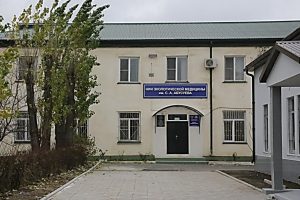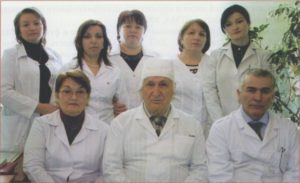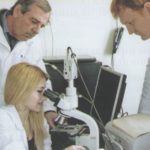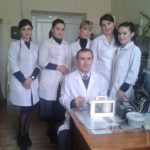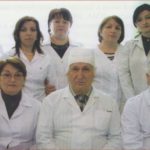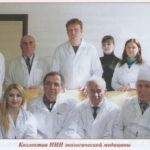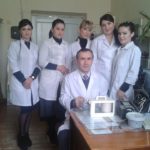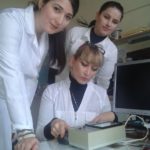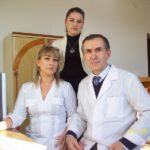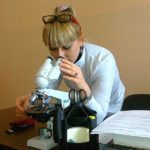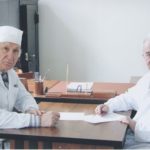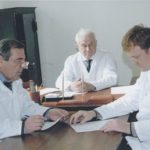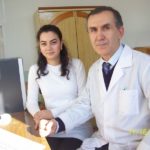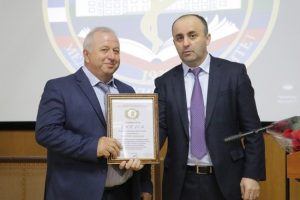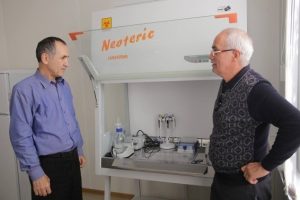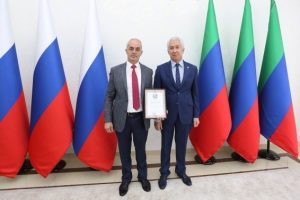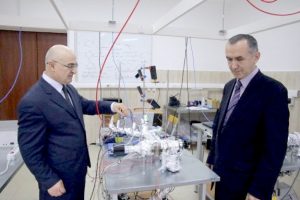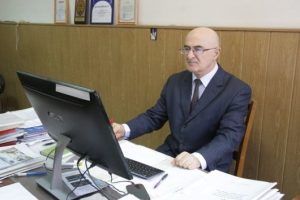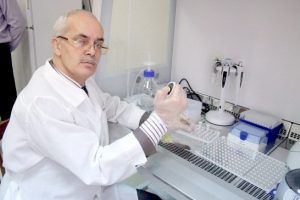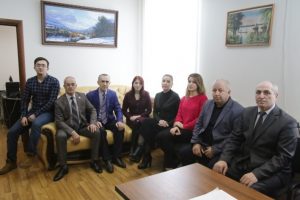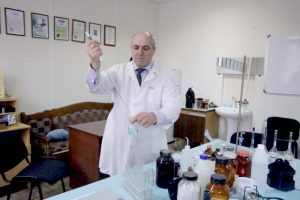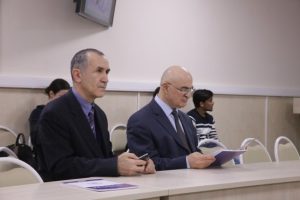Объявления
-
Памятки «Навигатор профилактики», разработанные Московским...
Уважаемые преподаватели и кураторы ФГБОУ ВО ДГМУ Минздрава России! В дополнение к ранее направленному письму от 13 октября 2022 г. № 06-14207/09-18/22 и в...
13.12.2022
2075
-
Выборы на замещение следующих должностей по срочному...
ДГМУ объявляет выборы на замещение следующих должностей по срочному трудовому договору, в связи с истечением срока избрания: список...
22.07.2024
3
-
III Всероссийская конференция «TED-Medical»
Дагестанский государственный медицинский университет приглашает членов СНО/СНК ДГМУ и других ВУЗов Российской Федерации, а также учащихся...
16.07.2024
101
-
Объявлен прием заявок на IX Всероссийский конкурс...
Открыт прием заявок на IX Всероссийский конкурс научно-исследовательских работ студентов и аспирантов Российских образовательных организаций...
08.07.2024
92
-
Осторожно, мошенники!
Уважаемые коллеги и обучающиеся! Хочу обратиться ко всем вам в связи с распространением в мессенджере Телеграмм сообщений мошеннического...
03.07.2024
94
-
Список научных и педагогических сотрудников, относящихся к...
Список ППС
02.07.2024
199
-
Как вести себя при обстреле
25.06.2024
112
-
Телефон для приема сообщений о коррупционных проявлениях:
68-32-80
-
Эл. почтовый ящик:
Ubdgmu@mail.ru
Scientific Research Institute of Environmental Medicine named after S. A. Abusuev
09.08.2021
163
Scientific Research Institute of Environmental Medicine of Dagestan State Medical University of the Ministry of Health of the Russian Federation named after S. A. Abusuev.
Head: Magomedrasul Gadzhievich Ataev
Address: 367000, Makhachkala, Abdul Aliev str., 1, Research Institute of Environmental Medicine named after S. A. Abusuev .
Website: https://dgmu.ru/nauka/nii-ekologicheskoj-meditsiny/
Email address: eco-medicine@yandex.ru
Phone: +7(8722)67-59-70
Fax: +7(8722)67-59-70
The main directions of activity approved by the order of the Ministry of Health of the Russian Federation No. 257 of 20.05.2009
- Ecology of mortality from respiratory diseases of the adult and child population of the mountains, foothills and plains of rural areas of the Republic of Dagestan.
- Environmental problems of oncological diseases of the children’s population in the Republic of Dagestan
- Morbidity, survival and mortality from lung cancer in the Republic of Dagestan
- Ecological and epidemiological aspects of the incidence of cardiovascular system pathology and diabetes mellitus in the population of ecological zones of rural areas of the Republic of Dagestan.
- Genetic, age and gender characteristics of the health status of the rural population under the influence of meteorological, agrochemical and geological factors of mountainous, foothill and lowland ecological zones.
- The use of molecular and atomic layer deposition for implants, antibacterial, photocatalytically active nanocoats.
- Disorders of mineral metabolism in humans and animals and the development of effective, environmentally friendly methods of their pharmacocorrection.
- Genomic studies of polymorphic gene loci associated with multifactorial diseases and mutations of hereditary diseases in the indigenous ethnic populations of Dagestan for the transition to personalized medicine.
- Epidemiological and genetic aspects of carbohydrate metabolism disorders in thyroid diseases.
- Prevention of hepatotoxic effects of pharmacotherapy, food additives and household chemicals.
- The influence of arsenic and hydrogen sulfide compounds on the health of the population and the development of new methods for cleaning drinking water from toxicants.
- Technology for cleaning the environment from pharmaceutical and other highly toxic pollutants using microalgae.
- Polymorphism of genes associated with arterial hypertension and metabolic syndrome in personalized medicine.
- Genetic aspects of cancer incidence in mountainous and lowland areas and the study of ways to reduce the risk to the life and health of the population.
- The role of endogenous and exogenous risk factors for the development of metabolic syndrome in urban and rural conditions.
- Evaluation of immunocytochemical cancer markers in cervical samples for early diagnosis and prevention of cervical intraepithelial neoplasia of 1-2 degrees.
According to WHO experts, the morbidity and potential of life and health depend on the quality of the ecosystem by 80%. If we are talking about health, which is inherited in subsequent generations, then it is fair to admit that the health of the population depends 100% on the health of the environment.
History
The first stage
The Research Institute of Environmental Medicine, the original name of the “Central Research Laboratory of DSMA” was opened by order of the Ministry of Health of the RSFSR No. 66 of 05.04. 1991.
A. Magomedov, Candidate of Medical Sciences, was elected the first director of the Central Research Institute. Laboratories of biochemistry, immunology and pathomorphology were opened as a part of the Central Research Institute. The laboratories were headed by researchers with certain scientific experience: M. A. Magomedov, Ph. D., K. Z. Kurbanov, Ph. D., and T. A. Leontieva, Ph. D.
Initially, the Central Research Institute was assigned 2 tasks: the development of scientific foundations for the health of children and pregnant women; the development of methods for the prevention, diagnosis and treatment of iron deficiency anemia and leukemia. To solve the tasks set, the laboratory took part in the implementation of the program “Healthy offspring — the future of the nation”. The results of the research were published in the local and central press and reported at conferences.
The rector of DSMA, Professor A.M. Golubev, laid the foundations for the successful development of the original direction on the problem in the Central Research Institute: “Biological systems in the conditions of using perfluorocarbon emulsions” (plasma substitutes with the function of oxygen transport) in 1996.
At the same time, laboratories of bacteriology and microcirculation were additionally organized in the Central Research Institute.
Under the leadership of Professors N. G. Volzhina and E. R. Nagiyev in the laboratory of biochemistry, as well as Associate Professor M. A. Magomedov researches were conducted to study structural and functional changes and the state of lipid peroxidation of erythrocyte membranes in acute blood loss, supertoxic poisoning with metaphosomes, followed by correction of these conditions by infusion of perfluorane emulsion. 4 candidate dissertations were defended.
In the laboratories of morphology (under the guidance of Professor A.M. Golubev, senior researcher T. A. Leontieva) and bacteriology (under the guidance of senior researcher D.Gaziumarova), studies were conducted on the topic: “Morphofunctional characteristics and antimicrobial activity of mononuclear and segmentonuclear phagocytes after administration of perfluorane”. 4 candidate dissertations were planned and defended in this direction.
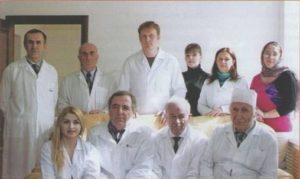 In the microcirculation laboratory, the state of the microcirculatory bed in various extreme situations and their correction with perfluorane were studied. According to the results of the research, 5 candidate dissertations were successfully defended: D. M. Rahimov, X. M. Malachilaeva, K. Sh.Khanakhmedova, A. A. Osmanova, R. D. Meilanova.
In the microcirculation laboratory, the state of the microcirculatory bed in various extreme situations and their correction with perfluorane were studied. According to the results of the research, 5 candidate dissertations were successfully defended: D. M. Rahimov, X. M. Malachilaeva, K. Sh.Khanakhmedova, A. A. Osmanova, R. D. Meilanova.
2 patents for the invention were obtained. In this laboratory, under the guidance of Professor M. A. Magomedov, a number of candidate dissertations were completed (Sh. A. Sultanov, G. M. Dalgatov, M. I. Magomedgadzhiev, N. I. Bulaeva, M. Kh. Zafer, A.I.Arslanbekov, M. M. Mushtilieva, M. M. Dalgatov, R. I. Ragimova, Kh.G. Musalov).
Together with the Department of Propaedeutics of Internal Diseases under the guidance of Professors I. A. Shamov and M. A. Magomedova, the candidate’s thesis of N. R. Mollayeva was performed and defended. A system of training of settled teachers for various departments has been worked out through the Central Research Institute for 20 years: Kh. G. Suleymanov- assistant of the Department of Histology, K. Sh. Khanakhmedova -assistant of the Department of Clinical Pharmacology, R. D. Meilanova-assistant of the Department of Anatomy, A. A. Osmanov, Kh. M. Malachilaeva-assistant of the Department of Pathological Anatomy.
The second stage
During these years a number of scientific studies were carried out in the ecological direction, namely human ecology. Taking this into account, the Scientific Council of the DSMA decided to reorganize the Central Research Institute of Human Ecology of Mountain Territories. A well-known ecologist, head of the Department of General Hygiene and Human Ecology, Doctor of Medical Sciences, Professor D. G. Khachirov was elected director of the Institute in 2009. The Research Institute has investigated such problems as the epidemiological and environmental aspects of the incidence of periodontitis, mortality from myocardial infarction, hypertension clinics, the incidence of Hodgkin’s disease, respiratory diseases, bronchial asthma, child mortality from respiratory diseases.
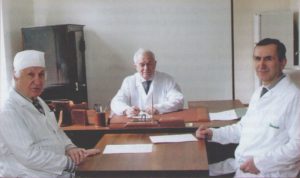 8 candidate dissertations were defended and completed (G. G. Abdurakhmanov, S. S. Ibragimova, P. Sh. Gitinova, Z. Z. Nadirova, E. K. Abdullayeva, A.M. Abdulazizov, A.M. Masueva, A.M. Abakarova). The study of the cardiovascular system is continuing, taking into account the environmental factors of the republic.
8 candidate dissertations were defended and completed (G. G. Abdurakhmanov, S. S. Ibragimova, P. Sh. Gitinova, Z. Z. Nadirova, E. K. Abdullayeva, A.M. Abdulazizov, A.M. Masueva, A.M. Abakarova). The study of the cardiovascular system is continuing, taking into account the environmental factors of the republic.
The third stage
 The head of the Department of Endocrinology, Doctor of Medical Sciences, Professor S. A. Abusuev has become the director of the Research Institute in 2011. D. G. Khachirov took the position of scientific director of the Institute. By the decision of the Academic Council of DSMA, the name of the institute was changed to the Research Institute of Environmental Medicine (RI EM) in September 2011.
The head of the Department of Endocrinology, Doctor of Medical Sciences, Professor S. A. Abusuev has become the director of the Research Institute in 2011. D. G. Khachirov took the position of scientific director of the Institute. By the decision of the Academic Council of DSMA, the name of the institute was changed to the Research Institute of Environmental Medicine (RI EM) in September 2011.
Professors M. M. Bakuev (Department of Morphofunctional Research), M. Z. Saidov (Laboratory of Medical Genetics), M. A. Magomedov (Department of Environmental Epidemiology) was working fruitfully at the EM Research Institute from 2015 till 2017.
The Department of Environmental Epidemiology of the Research Institute was headed by senior researcher, Associate Professor M. G.Ataev, who was appointed Deputy director of the Research Institute in 2015. The department is engaged in research of epidemiology, morbidity and mortality from diseases of the circulatory system, respiration, digestion and predicting the dynamics of environmentally dependent and socially significant diseases.
The post of director has been occupied by Candidate of Medical Sciences, Associate Professor M. G. Ataev since 2017. The department of personalized medicine was organized in 2018. The main laboratory of this department was the laboratory of medical genomics. The head of the laboratory is a well-known geneticist, PhD, Associate Professor M. O. Radzhabov, who worked as the coordinator of international research of the human genome in Eurasia Genographic project.
Two projects submitted by M. O. Radzhabov received grant support from the Head of Dagestan Republic for Science in 2018 and 2019. Agreements have been signed on conducting genomic sequencing of representatives of the main ethnic groups of the population of Dagestan with major genetic research centers of Russia in Moscow and Tomsk. M. T. Yusupova studied the epidemiology of toxoplasmosis in the laboratories of the Department of Environmental Epidemiology , H. Suleymanova – the prevalence of oncological diseases in the ecozones of Dagestan and the North Caucasus, S. O. Omarova-the epidemiology of diabetes mellitus, K. K. Magomedov-histochemical features of the thyroid gland in goiter. The Research Institute was named after S. A. Abusuev and a memorial plaque was installed at the entrance to the buildings of the Research Institute on the 80th anniversary of the birth of Professor S. A. Abusuev in December 2019.
Cooperation of the Research Institute with the Department of General Hygiene and Human Ecology
- Employees of the Department of General Hygiene and Human Ecology of DSMU take an active part in the work of the Research Institute.
The department was headed by Doctor of Medical Sciences, Professor D. G. Khachirov from 1987 to 2015. He is an Honored Scientist of the Republic of Dagestan, winner of the State Scholarship of the Russian Federation “Outstanding Scientists of Russia”, winner of the State Prize of the Republic of Dagestan, awarded the silver medal of Peter the Great “For Labor Valor”.
Currently, the department is headed by MD, Professor M. A. Magomedov.
The department stuff: Associate Professors L. M. Shakhnazarova, G. H. Mamtseva; senior lecturer, Ph. D. P. Sh. Gitinova; assistants P. R. Ibragimova, Z. M. Hasanova; Ph. D. S. S. Ibragimova; assistant, Ph. D. A. M. Abakarova; Ph. D. E. K. Abdullayeva, P. D. Kazanbieva; senior laboratory assistant Z.Z. Surkhaeva; laboratory assistants G. R. Novruzova.
The department has been developing the scientific direction “Long-term biological consequences of separate, combined and total effects of low-intensity environmental factors” over the past 20 years, proposed by Professor D. G. Khachirov in 1993.
In the complex of research on this urgent problem, the department cooperates with other departments of the DSMA.
The staff of the department carried out research on contamination of objects of the ecosystem of Dagestan with anthropogenic radionuclides (cesium-137 and strontium-90) in 1981-1993.
The contamination of these radionuclides in the objects of Dagestan Republic ecosystem was studied, individual equivalent absorbed doses of ionizing radiation were calculated, a data bank of the intensity of the use of agrochemicals was created.
On the basis of the department, doctoral dissertations (S. A. Abusuev, Kh. E. Kazieva, T. A. Gadzhieva, M. G. Magomedov) and candidate dissertations (P. Sh. Gitinova, E. K. Abdullayeva, S. S. Ibragimova, A.M. Abakarova, Yusupova N. Z.) are defended, a postgraduate students U. A. Magomedova, Z. M. Hasanova complete their dissertation. Employees together with the Department of General Hygiene and Human Ecology of other departments of the university also defended their candidate theses: G. G. Abdurakhmanov, A.M. Masueva, 3.A. Nadirova, H. A. Osmanova.
- The staff of the Department of Endocrinology together with the Research Institute of EM planned a research project to study the environmental epidemiology of iodine deficiency conditions, diabetes mellitus and metabolic syndrome. According to the results of the conducted research, the doctoral (Abdulkhalikov A. S.) and candidate dissertations (Alimetova K. A., Arslanbekova A. Ch.) were defended, three doctoral works were planned (Kamalov K. G., Soltakhanov E. R., Karaeva A. F.) and 3 candidate theses (Akmurzayeva K. R., Tuaeva S. A., Magomedova I. M.). Dagestan is an endemic region for iodine deficiency, which is accompanied not only by a violation of the structure and function of the thyroid gland, but also negatively affecting the cognitive function of the brain and reproductive function.
- The Department of Pathological Anatomy most actively cooperates with both the Research Institute and other departments of DSMU. More than 20 dissertations were defended on the pathogenesis of urgent conditions in injuries and poisoning, the effectiveness and safety of perfluorane under the guidance of Ph. D., Associate Professor M. A. Magomedov.
- The Department of Pathological Physiology, headed by Professor, MD M. Z. Saidov made a great contribution to the development of immunological and genetic topics of research. Several dissertations were defended under the supervision of M. Z. Saidov.
- The Department of Hospital Therapy No. 1 is the flagship of the Research Institute for Internal Diseases. The department was headed by one of the founders of therapy in Dagestan, Professor H. E. Gadzhiev. His scientific directions are successfully developed at the department by Professors A. Sh. Khasaeva, S. N. Mammaev and G. E. Gadzhiev. On the basis of the Research Institute, the staff of the Department of Hospital Therapy No. 1 completed 3 candidate dissertations (Masueva A.M., Aliyeva D., Osmanova H. A.)
- The Department of Propaedeutics of Internal Diseases has been headed by Doctor of Medical Sciences, Professor I. A. Shamov in 1980, who actively introduces the basics of evidence-based medicine, ethics, and deontology into medical education. Under the guidance of Professor I. A. Shamov, two doctoral dissertations (N. R. Mollaeva, Kh. E. Kazieva) and 2 candidate dissertations (G. V. Untilov, A.M. Abuyazidov) were completed on the basis of the Research Institute.
- The cooperation of the Research Institute with the departments of the Faculty of Dentistry became the basis for the implementation of several dissertation works (Sutaeva T. R., Ordashev Kh. A., Asiyatilov G. A., Abdurakhmanov G. G., Rasulov I. M.).
- The departments of Obstetrics and Gynecology of DSMU actively cooperate with the Research Institute of EM named after S. A. Abusuev. Among their planned dissertations, 1 doctoral dissertation (Shikhnabieva N. D.) and 2 candidate dissertations (Rahimova R. I., Odamanova M. A.) were defended.
- The Department of Human Anatomy conducted research on the morphometry of the lymphatic system in injuries. Based on the research materials, 2 candidate dissertations were defended (Shugaeva K. Ya., Osmanova).
- The Department of Skin and Venereal Diseases actively participated in the clinic of epidemiological studies of mycoses and acne in Dagestan. 2 candidate dissertations were defended (Labazanova R. N., Mamasheva G. D.).
- The Department of Pediatrics together with the EM Research Institute conducted a series of studies on the epidemiology of anemia among children, which ended with the defense of a candidate’s thesis (Yunusova I. M.)
12. The Research Institute also cooperates with the Ministry of Health of the Republic of Dagestan, the Mandatory Medical Insurance Fund for Dagestan.
2019 year

